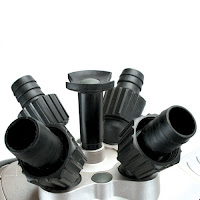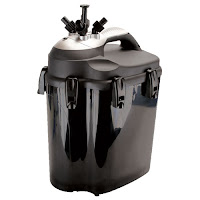A customer recently asked me a question about using a canister filter on their saltwater aquarium. The customer had read on Reef Central that you should not use a canister filter on a saltwater aquarium, especially on a reef aquarium. That they do not work well, and will cause high nitrates.
This is a topic that you will see differing opinions on. The problem with canister filters is not that they don’t work on saltwater or reef aquariums, they work very well. Any biological filter is going to produce nitrate on a closed aquarium system, it is the natural end product of the nitrogen cycle.
This is why many reef tank owners will remove the bio balls from their wet dry filters, or run their systems on a sump only set up, in an effort to reduce nitrate production. This is why some people are of the opinion that canister filters should not be used on a reef tank. You can get away with this approach if you have a sufficient amount of live rock and substrate in your aquarium to act as your biological filter. In fact, live rock is an excellent source of nitrifying bacteria, and will function as a very efficient biological filter in an aquarium with enough rock. Most reef set ups will work well without a dedicated biological filter, so long as the biological load is not too high, and you are using a good protein skimmer. This method is often referred to as a “Berlin” style aquarium (lots of live rock, good water movement, heavy protein skimming, and no biological filter). Canister filters can still be used on reef tanks, they can be used as additional biological filters in heavily stocked tanks, and can easily be used for whatever chemical filtration media you may want to use.
Saltwater fish only tanks are a different story; in most cases you will need a biological filter to handle the fish waste and biological load, even if your tank has live rock in it. You will also want to have a mechanical filter on a saltwater fish tank, especially if you have large fish in your tank. Most canister filters give you the ability to operate them in different ways. You can use them for biological, mechanical or chemical filtration as needed.
Nitrate is going to be produced in any set up, some more than others. My best advice is to use as much filtration as your aquarium demands. Ammonia and Nitrite should be near zero in an established aquarium, if you are detecting either, chances are your aquariums biological filter is insufficient. Nitrate levels will creep up slowly over time in any system, so whatever filtration method you employ, you still need to monitor your water chemistry. Water changes will remove nitrate from your aquarium, so as long as you are testing your water, and performing regular water changes, nitrates should not be a problem.
Speaking canister filters, here’s a video my staff created to help aquarists set up a canister filter on their aquarium. Canister Filter Video
Thanks,
Dave

 That Fish Blog – Aquarium Advice and Information
That Fish Blog – Aquarium Advice and Information

